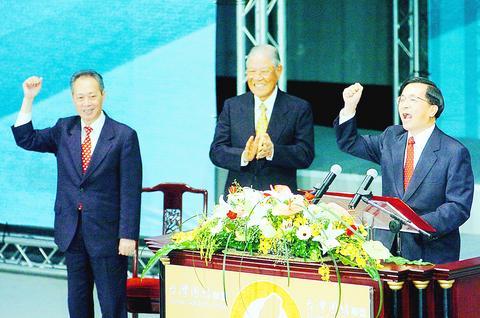On the third anniversary of the founding of the Taiwan Solidarity Union (TSU) yesterday, President Chen Shui-bian (
"The TSU and Democratic Progressive Party [DPP] are brother parties; both identify with the social trends of Taiwanese people," Chen said. "I would like to congratulate and acknowledge the TSU's contributions to Taiwanese democracy in the past three years."

PHOTO: SEAN CHAO, TAIPEI TIMES
Chen emphasis that the relationship between the DPP and TSU is a reciprocal one.
"Some might have thought when the TSU was founded that its impact on the DPP would be negative," Chen said. "But over the course of three years, it is clear that the bond between the two parties is strong."
Chen pointed out other merits of the TSU.
"The TSU has managed to persist in its pro-localization ideology and reflect the mainstream thinking of the public," Chen said.
Urging more progress on national unification, Chen said, "In order to safeguard the safety and the stability of Taiwan, the people have to be united," he said. "The year-end legislative elections is a touchstone of how people feel about Taiwan. I hope that [the DPP and TSU] will win over a majority of legislative seats, not to increase the influence of a particular political party, but to have a more united country."
Chen also expressed his view on the importance of the legislative speaker's impartiality.
"A legislative speaker should be politically neutral and serve only the people," Chen said. "Therefore, I am against whoever is in this position to be the chairman, vice-chairman, or a member of the central committee of any political party."
Lee, who helped found the TSU in 2001 and is regarded as the party's spiritual leader, urged all legislative candidates to focus on the needs of their electoral districts.
"This three-year anniversary marks a new beginning for the TSU," Lee said. "I want to remind the candidates who are running for legislative seats to put the electorate first. Whatever they do, they should do because of the needs of their constituents."
This year, the TSU has nominated 28 legislative candidates to represent 23 electoral districts.
The former president also said that the country should let go of its past and strengthen its pro-localization politics.
TSU Chairman Huang Chu-wen (
"I believe that the success of these events would have been hard to achieve without the TSU's participation," Huang said.

FALSE DOCUMENTS? Actor William Liao said he was ‘voluntarily cooperating’ with police after a suspect was accused of helping to produce false medical certificates Police yesterday questioned at least six entertainers amid allegations of evasion of compulsory military service, with Lee Chuan (李銓), a member of boy band Choc7 (超克7), and actor Daniel Chen (陳大天) among those summoned. The New Taipei City District Prosecutors’ Office in January launched an investigation into a group that was allegedly helping men dodge compulsory military service using falsified medical documents. Actor Darren Wang (王大陸) has been accused of being one of the group’s clients. As the investigation expanded, investigators at New Taipei City’s Yonghe Precinct said that other entertainers commissioned the group to obtain false documents. The main suspect, a man surnamed

DEMOGRAPHICS: Robotics is the most promising answer to looming labor woes, the long-term care system and national contingency response, an official said Taiwan is to launch a five-year plan to boost the robotics industry in a bid to address labor shortages stemming from a declining and aging population, the Executive Yuan said yesterday. The government approved the initiative, dubbed the Smart Robotics Industry Promotion Plan, via executive order, senior officials told a post-Cabinet meeting news conference in Taipei. Taiwan’s population decline would strain the economy and the nation’s ability to care for vulnerable and elderly people, said Peter Hong (洪樂文), who heads the National Science and Technology Council’s (NSTC) Department of Engineering and Technologies. Projections show that the proportion of Taiwanese 65 or older would

Democracies must remain united in the face of a shifting geopolitical landscape, former president Tsai Ing-wen (蔡英文) told the Copenhagen Democracy Summit on Tuesday, while emphasizing the importance of Taiwan’s security to the world. “Taiwan’s security is essential to regional stability and to defending democratic values amid mounting authoritarianism,” Tsai said at the annual forum in the Danish capital. Noting a “new geopolitical landscape” in which global trade and security face “uncertainty and unpredictability,” Tsai said that democracies must remain united and be more committed to building up resilience together in the face of challenges. Resilience “allows us to absorb shocks, adapt under

Taiwan Semiconductor Manufacturing Co (TSMC, 台積電) yesterday said it is building nine new advanced wafer manufacturing and packaging factories this year, accelerating its expansion amid strong demand for high-performance computing (HPC) and artificial intelligence (AI) applications. The chipmaker built on average five factories per year from 2021 to last year and three from 2017 to 2020, TSMC vice president of advanced technology and mask engineering T.S. Chang (張宗生) said at the company’s annual technology symposium in Hsinchu City. “We are quickening our pace even faster in 2025. We plan to build nine new factories, including eight wafer fabrication plants and one advanced